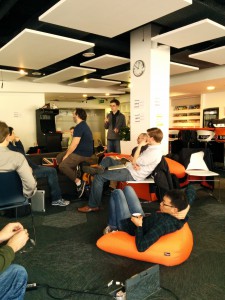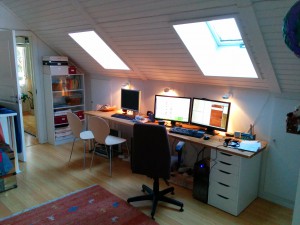I’m writing this just hours after the HTTPbis design team meeting in London 2014 has ended.
Around 30 people attended the meeting i Mozilla’s central London office. The fridge was filled up with drinks, the shelves were full of snacks and goodies. The day could begin. This is the Saturday after the IETF89 week so most people attending had already spent the whole or parts of the week before here in London doing other HTTP and network related work. The HTTPbis sessions at the IETF itself were productive and had already pushed us forward.
We started at 9:30 and we quickly got to work. Mark Nottingham guided us through the day with usual efficiency.
We all basically hang out in a huge room, some in chairs, some in sofas and a bunch of people on the floor or just standing up. We had mikes passed around and the http2 discussions were flowing back and forth depending on the topics and what people felt about them. Some of the issues that were nailed down this time and will end up detailed in the upcoming draft-11 are (strictly speaking, we only discussed the things and formed opinions, as by IETF guidelines we can’t decide things on an offline meeting like this):
- Priorities of streams will have a dependency graph or direction, making individual streams less or more important than other
- A client can send headers without compression and tell the proxy that the header shouldn’t be compressed – used a way to mitigate some of the compression security problems
- There will be no TLS renegotiation allowed mid-session. Basically a client will have to tear down the connection and negotiate again if suddenly a need to use a client certificate arises.
- Alt-Svc is the way forward so ALTSVC will appear a new frame in draft-11. This is the way to signal to an application that there is another “route” t
 o the same content on the same server. This will allow for what is popularly known as “opportunistic encryption” or at least one sort of that. In short, you can do “plain-text” HTTP over a TLS connection using this…
o the same content on the same server. This will allow for what is popularly known as “opportunistic encryption” or at least one sort of that. In short, you can do “plain-text” HTTP over a TLS connection using this… - We decided that a server should support gzip contents from clients
There were some other things too handled, but I believe those are the main changes. When the afternoon started to turn long, beers and other beverages were brought out and we did enjoy a relaxing social finale of the day before we split up in smaller groups and headed out in the busy London night to get dinner…
Thanks everyone for a great day. I also appreciated meeting several people in real-life I never met before, only discussed with and read emails from online and of course some old friends I hadn’t seen in a long time!
Oh, there’s also a new rough time frame for http2 going forward. Nearest in time would be the draft-11 at the end of March and another interim in the beginning of June (Boston?).
As a reminder, here’s what was happened for draft-10, and here is http2 draft-10.
Out of all people present today, I believe Mozilla was the company with the largest team (8 attendees) – funnily enough none of us Mozillians there actually work in this office or even in this country.



